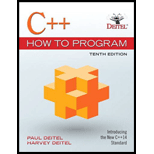
C++ How to Program (Early Objects Version)
10th Edition
ISBN: 9780134448824
Author: Paul Deitel; Harvey M. Deitel
Publisher: Pearson Education (US)
expand_more
expand_more
format_list_bulleted
Expert Solution & Answer
Want to see the full answer?
Check out a sample textbook solution
Students have asked these similar questions
In a shopping cart, there are various items, which can either belong to the category of household items or electronic items. The following UML diagram illustrates the relationship between items, household items, and electronic items.
//Implementation Class
public class ShoppingCart{
public static void main(String[] args){
final int MAX_ITEM = 50;
Item cart = new Item[MAX_ITEM];
addItem(cart); // populate the item array
printItem(cart);
}
}
Considering that all the data definition classes and the implementation class are complete, which of the following Object-Oriented Programming (OOP) concepts do you need to use in the above context?
i) Polymorphism
ii) Method Overloading
iii) Method Overriding
iv) Dynamic Binding
v) Abstract Class
Explain, using course terminology, how you would use any of the above concepts to model the given scenario.
Answer this JAVA OOP question below:
An Employee has a name, employee ID, and department. An Employee object must be created with all its attributes. The UML diagram is provided below:
- name: String - employeeId: String - department: String
+ Employee(name: String, employeeId: String, department: String) + setName(name: String): void + setEmployeeId(employeeId: String): void + setDepartment(department: String): void + getName(): String + getEmployeeId(): String + getDepartment(): String + toString(): String
A faculty is an Employee with an additional field String field: rank
public class TestImplementation{
public static void main(String[] args){
Employee[] allEmployee = new Employee[100];
// create an employee object with name Tom Evan, employee ID 001 and department IST and store it in allEmployee
// create a faculty object with name Adam Scott, employee ID 002, department IST and rank Professor and store it in allEmployee } }
Please answer this JAVA OOP question that is given below:
An Employee has a name, employee ID, and department. An Employee object must be created with all its attributes. The UML diagram is provided below:
- name: String - employeeId: String - department: String
+ Employee(name: String, employeeId: String, department: String) + setName(name: String): void + setEmployeeId(employeeId: String): void + setDepartment(department: String): void + getName(): String + getEmployeeId(): String + getDepartment(): String + toString(): String
A faculty is an Employee with an additional field String field: rank
Assuming the Employee class is fully implemented, define a Professor class in Java with the following:
A toString() method that includes both the inherited attributes and the specialization
Chapter 12 Solutions
C++ How to Program (Early Objects Version)
Ch. 12 - (Programming in the General) How is it that...Ch. 12 - (Polymorphism vs. switch logic) Discuss the...Ch. 12 - (Inheriting Interface vs. Implementation)...Ch. 12 - Prob. 12.6ECh. 12 - Prob. 12.7ECh. 12 - Prob. 12.8ECh. 12 - Prob. 12.9ECh. 12 - (Polymorphic Application) You've been asked to...Ch. 12 - (Payroll-System Modification) Modify the payroll...Ch. 12 - Prob. 12.12E
Knowledge Booster
Similar questions
- Please answer JAVA OOP question below: An Employee has a name, employee ID, and department. An Employee object must be created with all its attributes. The UML diagram is provided below: - name: String - employeeId: String - department: String + Employee(name: String, employeeId: String, department: String) + setName(name: String): void + setEmployeeId(employeeId: String): void + setDepartment(department: String): void + getName(): String + getEmployeeId(): String + getDepartment(): String + toString(): String A faculty is an Employee with an additional field String field: rank Assuming the Employee class is fully implemented, define a Professor class in Java with the following: Instance variable(s) A Constructorarrow_forwardDevelop a C++ program that execute the operation as stated by TM for addition of two binary numbers (see attached image). Your code should receive two binary numbers and output the resulting sum (also in binary). Make sure your code mimics the TM operations (dealing with the binary numbers as a string of characters 1 and 0, and following the logic to increase the first number and decreasing the second one. Try your TM for the following examples: 1101 and 101, resulting 10010; and 1101 and 11, resulting 10000.arrow_forwardI need to define and discuss the uses of one monitoring or troubleshooting tool in Windows Server 2019. thank youarrow_forward
- I would likr toget help with the following concepts: - Windows Server features - Windows Server versus Windows 10 used as a client-server networkarrow_forwardI need to define and discuss the uses of one monitoring or troubleshooting tool in Windows Server 2019. thank youarrow_forwardWhy is planning for the retirement system and transition critical?arrow_forward
arrow_back_ios
SEE MORE QUESTIONS
arrow_forward_ios
Recommended textbooks for you
 C++ for Engineers and ScientistsComputer ScienceISBN:9781133187844Author:Bronson, Gary J.Publisher:Course Technology Ptr
C++ for Engineers and ScientistsComputer ScienceISBN:9781133187844Author:Bronson, Gary J.Publisher:Course Technology Ptr C++ Programming: From Problem Analysis to Program...Computer ScienceISBN:9781337102087Author:D. S. MalikPublisher:Cengage Learning
C++ Programming: From Problem Analysis to Program...Computer ScienceISBN:9781337102087Author:D. S. MalikPublisher:Cengage Learning EBK JAVA PROGRAMMINGComputer ScienceISBN:9781337671385Author:FARRELLPublisher:CENGAGE LEARNING - CONSIGNMENT
EBK JAVA PROGRAMMINGComputer ScienceISBN:9781337671385Author:FARRELLPublisher:CENGAGE LEARNING - CONSIGNMENT Microsoft Visual C#Computer ScienceISBN:9781337102100Author:Joyce, Farrell.Publisher:Cengage Learning,
Microsoft Visual C#Computer ScienceISBN:9781337102100Author:Joyce, Farrell.Publisher:Cengage Learning, Programming with Microsoft Visual Basic 2017Computer ScienceISBN:9781337102124Author:Diane ZakPublisher:Cengage LearningProgramming Logic & Design ComprehensiveComputer ScienceISBN:9781337669405Author:FARRELLPublisher:Cengage
Programming with Microsoft Visual Basic 2017Computer ScienceISBN:9781337102124Author:Diane ZakPublisher:Cengage LearningProgramming Logic & Design ComprehensiveComputer ScienceISBN:9781337669405Author:FARRELLPublisher:Cengage

C++ for Engineers and Scientists
Computer Science
ISBN:9781133187844
Author:Bronson, Gary J.
Publisher:Course Technology Ptr

C++ Programming: From Problem Analysis to Program...
Computer Science
ISBN:9781337102087
Author:D. S. Malik
Publisher:Cengage Learning

EBK JAVA PROGRAMMING
Computer Science
ISBN:9781337671385
Author:FARRELL
Publisher:CENGAGE LEARNING - CONSIGNMENT

Microsoft Visual C#
Computer Science
ISBN:9781337102100
Author:Joyce, Farrell.
Publisher:Cengage Learning,

Programming with Microsoft Visual Basic 2017
Computer Science
ISBN:9781337102124
Author:Diane Zak
Publisher:Cengage Learning

Programming Logic & Design Comprehensive
Computer Science
ISBN:9781337669405
Author:FARRELL
Publisher:Cengage